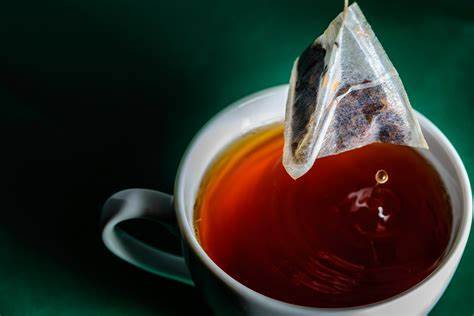Tea, a cherished beverage worldwide, offers comfort and numerous health benefits. However, recent studies reveal that certain tea bags may introduce billions of microplastics into your drink, posing potential health risks.
Understanding Microplastics
Microplastics are tiny plastic particles less than five millimeters in diameter. They originate from the breakdown of larger plastic items and are prevalent in various environments, including oceans and the atmosphere. Their small size allows them to infiltrate ecosystems and enter the human body through ingestion or inhalation.
Tea Bags as a Source of Microplastics
A Universitat Autònoma de Barcelona study examined the release of microplastics from different types of tea bags. Researchers tested tea bags made from nylon, polypropylene, and cellulose. When steeped in hot water at 95°C, these tea bags released significant amounts of microplastics into the beverage. Polypropylene tea bags emitted approximately 1.2 billion particles per milliliter, while nylon tea bags released around 8.18 million.
Health Implications of Microplastic Ingestion
The ingestion of microplastics raises concerns about their impact on human health. Studies indicate that intestinal cells can absorb these particles, with some even penetrating the cell nucleus. This intrusion may lead to inflammation, oxidative stress, and genetic damage, potentially contributing to chronic diseases and cancer.
Environmental Concerns
Beyond personal health, releasing microplastics from tea bags contributes to environmental pollution. These particles can enter waterways, affecting aquatic life and ecosystems. The pervasive nature of plastic pollution underscores the need for sustainable practices and materials in product manufacturing.
Recommendations for Tea Consumers
To minimize exposure to microplastics from tea bags, consider the following alternatives:
Loose-Leaf Tea: Brewing loose tea leaves using a stainless steel or glass infuser eliminates the need for tea bags, reducing microplastic contamination.
Paper or Fabric Tea Bags: Opt for tea bags made from natural fibers like paper or cotton, less likely to release microplastics when steeped.
Filtered Water: Using filtered water for brewing can help reduce additional microplastic contaminants present in tap water.
Industry Response and Future Directions
The tea industry is beginning to address these concerns by exploring alternative packaging materials and improving product labeling to inform consumers about the composition of tea bags. Researchers emphasize the need for standardized testing methods to assess microplastic contamination in food products and advocate for regulatory policies to mitigate this issue.
In Summary
While tea remains a beloved beverage, knowing the potential microplastic contamination from certain tea bags is essential. Consumers can enjoy their tea while minimizing health risks and environmental impact by choosing alternative brewing methods and supporting sustainable practices.


